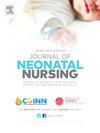Neonatal nurses' knowledge and use of non-pharmacological pain management interventions in Saudi Arabia
Q2 Nursing
引用次数: 0
Abstract
Introduction
Neonatal non-pharmacologic pain management interventions are not adequately used. Neonatal nurses’ knowledge is essential for the effective use of non-pharmacologic pain management interventions.
Aim
To assess neonatal nurses' knowledge and use of non-pharmacologic pain management in Saudi Arabia.
Methods
A Cross-sectional online survey was used. The study recruited 122 neonatal nurses working at Dr. Soliman Fakeeh Hospital. The instrument of this study was a questionnaire that included 7 items measuring the knowledge regarding neonatal pain and 25 items measuring the knowledge regarding non-pharmacological pain management. Data were analyzed using descriptive statistics and One-way ANOVA to compare the knowledge of neonatal nurses across the neonatal units.
Results
Thirty-two percent of the participants had a high level of knowledge regarding non-pharmacological pain management of neonates, 56% moderate, 10% low, and 2% very low. The most commonly used non-pharmacological pain management interventions were breastfeeding, cuddling, and swaddling. The least commonly used non-pharmacological pain management interventions were oral sucrose, positioning, and facilitated tucking.
Conclusion
Neonatal nurses have adequate knowledge regarding non-pharmacological pain management interventions. The use of sucrose was inadequate. Interventional programs are needed to increase the use of oral sucrose.
新生儿护士的知识和使用非药物疼痛管理干预在沙特阿拉伯
新生儿非药物疼痛管理干预措施没有充分使用。新生儿护士的知识对于有效使用非药物疼痛管理干预措施至关重要。目的评估沙特阿拉伯新生儿护士对非药物性疼痛管理的知识和使用情况。方法采用横断面在线调查方法。这项研究招募了122名在索利曼·法基医生医院工作的新生儿护士。本研究的工具是一份问卷,其中包括7个项目测量新生儿疼痛知识和25个项目测量非药物疼痛管理知识。数据分析采用描述性统计和单因素方差分析比较新生儿护士的知识在新生儿单位。结果32%的参与者对新生儿非药物疼痛管理知识水平较高,56%为中等,10%为低,2%为极低。最常用的非药物疼痛管理干预措施是母乳喂养、拥抱和襁褓。最不常用的非药物疼痛管理干预措施是口服蔗糖、体位和便利收纳。结论新生儿护士对非药物疼痛管理干预措施有充分的了解。蔗糖的用量不足。需要干预方案来增加口服蔗糖的使用。
本文章由计算机程序翻译,如有差异,请以英文原文为准。
求助全文
约1分钟内获得全文
求助全文
来源期刊

Journal of Neonatal Nursing
Nursing-Pediatrics
CiteScore
2.00
自引率
0.00%
发文量
143
期刊介绍:
Aims & Scope: This is the practical, bimonthly, research-based journal for all professionals concerned with the care of neonates and their families, both in hospital and the community. It aims to support the development of the essential practice, management, education and health promotion skills required by these professionals. The JNN will provide a forum for the exchange of ideas and information between the range of professionals working in this field; promote cooperation between these professionals; facilitate partnership care with families; provide information and informed opinion; promote innovation and change in the care of neonates and their families; and provide an education resource for this important rapidly developing field.
 求助内容:
求助内容: 应助结果提醒方式:
应助结果提醒方式:


